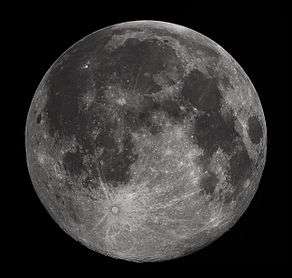Lunar south pole

The lunar south pole is of special interest to scientists because of the postulated occurrence of water ice in permanently shadowed areas around it. Of the lunar poles, the south pole is of greater interest because the area that remains in shadow is much larger than that at the north pole.[1] The lunar south pole craters are unique in that sunlight does not reach the bottom. Such craters are cold traps that contain a fossil record of the early solar system.[2]
Craters

The rotational axis of the Moon lies within Shackleton Crater. Notable craters nearest to the lunar south pole include De Gerlache, Sverdrup, Shoemaker, Faustini, Haworth, Nobile and Cabeus.
Exploration

Spacecraft from several countries have explored the region around the lunar south pole. Extensive studies were conducted by the Lunar Orbiter, Clementine, Lunar Prospector, Lunar Reconnaissance Orbiter, Kaguya, and Chandrayaan. NASA's LCROSS mission found a significant amount of water in Cabeus.[3]
Future
Future planned exploration of the Lunar south polar region includes a private mission by Shackleton Energy Company, no earlier than 2016. Shackleton intends to land a robotic precursor exploration rover to "identify and characterize the nature, composition and locations of the optimum ice concentrations at the north and Lunar south pole craters".[4]
Lunar Mission One is a British-led, unmanned Moon mission announced in November 2014 and planned for 2024.[5] It will attempt to land on the lunar south pole, then drill down at least 20m and possibly as deep as 100m. This could dramatically improve the understanding of the Moon's composition, its geologic history and formation, revealing new clues about the early Solar System. The mission is attempting to gain crowdfunding on Kickstarter.[6]
See also
References
- ↑ "South Pole Region of the Moon as Seen by Clementine". NASA. June 3, 1996. Retrieved March 4, 2010.
- ↑ "NASA Takes Aim at Moon with Double Sledgehammer". Space.com. February 27, 2008. Retrieved March 4, 2010.
- ↑ Chang, Kenneth (November 13, 2009). "LCROSS Mission Finds Water on Moon, NASA Scientists Say". The New York Times. Retrieved March 4, 2010.
- ↑ Shackleton Energy's cislunar economic development plans David Livingston interview with James Keravala, The Space Show, 14 Dec 2012, at 55:25-57:40, accessed 2012-12-22.
- ↑ "UK 'to lead moon landing' funded by public contributions". BBC. 19 November 2014. Retrieved 19 November 2014.
- ↑ "LUNAR MISSION ONE: A new lunar mission for everyone.". Kickstarter. 19 November 2014. Retrieved 19 November 2014.
